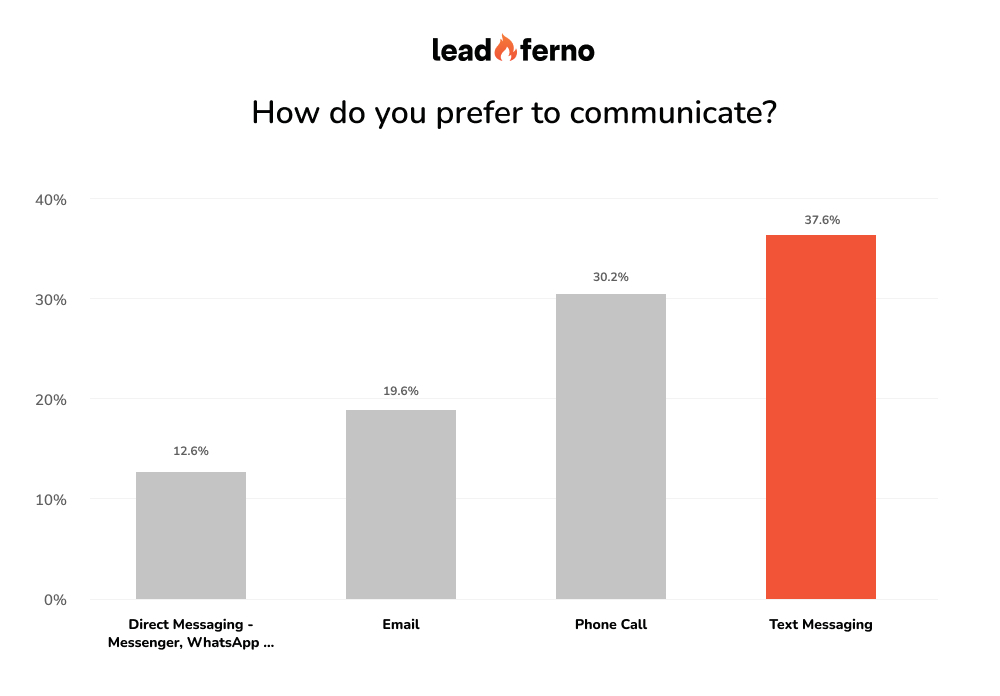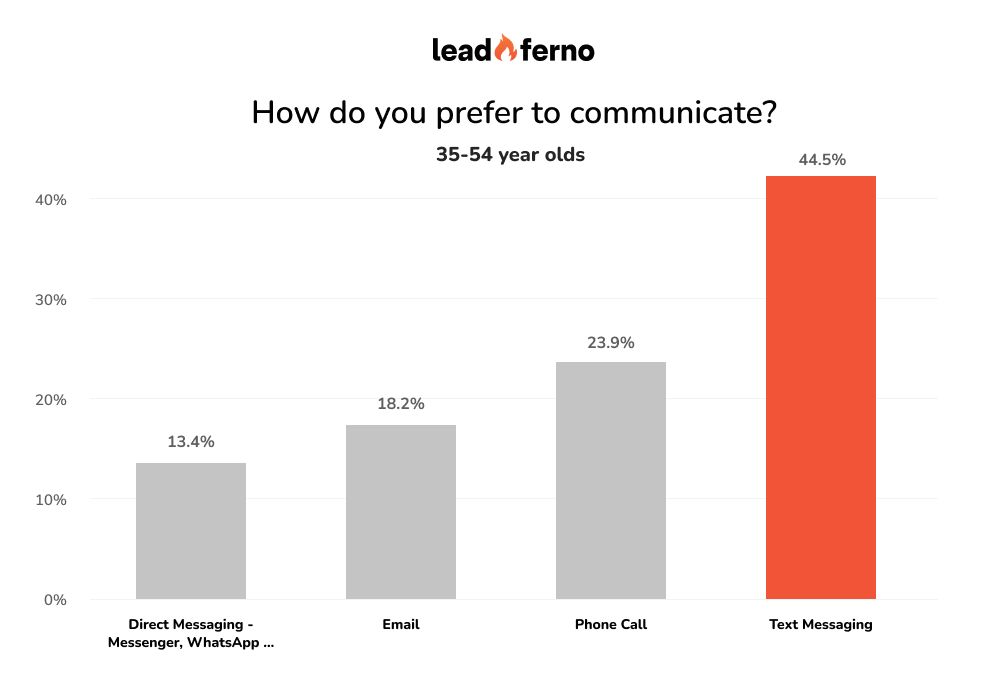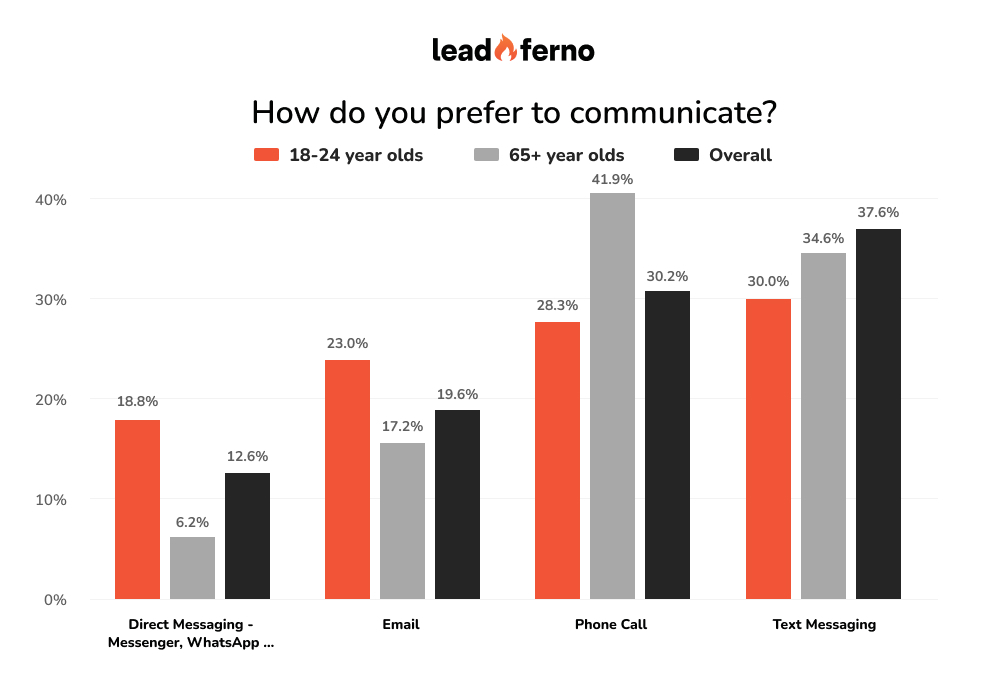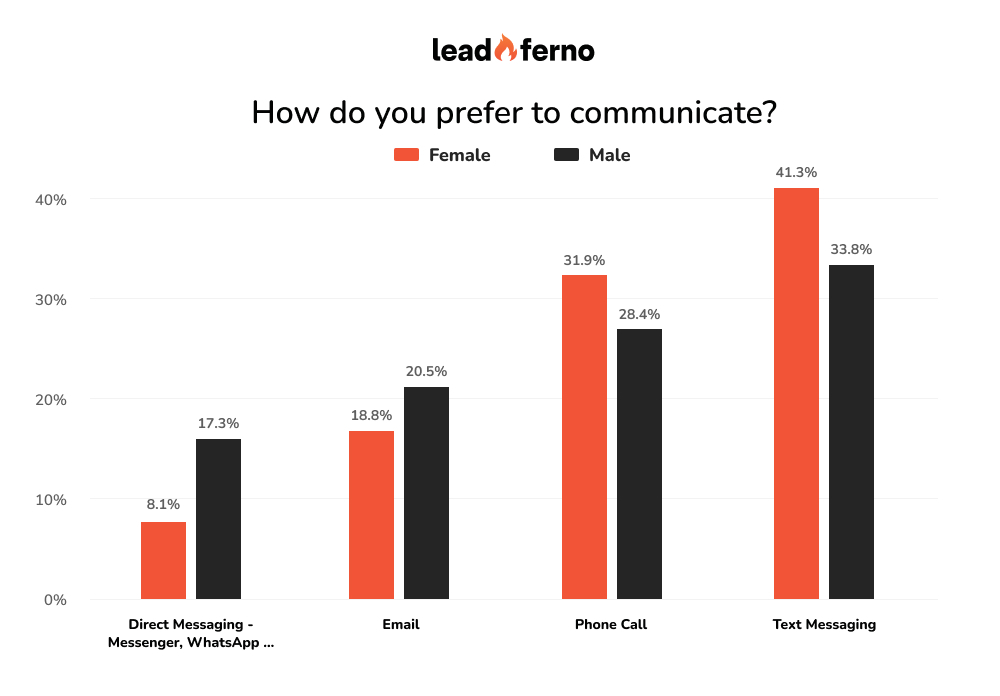SURVEY: Texting Is The Preferred Way To Communicate
When asked "How do you prefer to communicate?" the results show people prefer texting over phone calls, emails and other messaging apps. Texting is on top and here to stay.

Texting is taking a bigger place in everyday communications both personally and professionally. The sheer volume of text message growth is eye-popping: the number of texts sent over the last decade has grown over 7,700%. Amazingly, over 23 billion texts are sent everyday.
Our latest survey asked 2,000 US consumers “How do you prefer to communicate?” via Google Surveys. We’ve conducted this survey before but it included the qualifier of communicating with a business.
We wanted to run this survey to understand how people view communication channels overall, not just with businesses. We feel this is valuable in understanding how overall communication is trending. This survey leaves little doubt that texting and messaging is preferred above other channels.
SMS a clear leader over phone calls, emails and other messaging tools
Our survey showed that texting is the top choice for communication channels. 37.6% of our respondents said text messaging is their preferred communication channel, with 30.2% saying phone calls, 19.6% selecting email and 12.6% choosing direct messaging like WhatsApp, Facebook Messenger and similar apps.

If you zoom out and combine SMS with other messaging tools, the broader messaging category commands 50.2% of communication preferences.
Is email in a race to the bottom?
Nearly twice the respondents say texting is preferred over email. In our business focused survey we saw a 4% decrease year over year for email as the way to contact a business. Email is preferred less than phone calls and website forms.
The email inbox has become crowded and bulky, especially for personal communication. Engagement times with email is no where near the speed of messaging. One study shared that the average email is replied to in 90 minutes, whereas the average text response is just 90 seconds. That’s a 60X faster with texting.
It’s easy to see why texting and messaging solutions have replaced email for consumers.
🏎️ Ready to move faster? Get a business texting demo
35-54 year olds prefer texting by the greatest margin
Often with new trends and technology it’s thought to be the youngest of age groups adopting and driving it. That’s not really the case with texting from this survey.
Texting increases for 35-54 year olds as their preferred communication channel moving up to 44.5%. The 6% increase corresponds to a 6% drop in phone calls preference. Messaging tools saw a slight increase in preference to 13.4%.

35-54 year olds likely value the efficiency and asynchronous communication texting offers. The ability to check messages and responded to messages on your schedule just fits better.
Phone calls lead for 65+ year olds, Messaging apps grow for 18-24 year olds
A few interesting take-aways surface from our segmentation of our youngest and oldest age groups in this survey. As we have seen in our past surveys, the 231 respondents in the 65+ age group gravitates toward phone calls being the only ones that prefer phone (41.9%) ahead of text (34.6%). Messaging apps were preferred by only 6.2%, half of what the respondents are saying on the whole.

18-24 year olds diversify their messaging
For the youngest age group of 18-24 year olds, there were a few surprises. Of the 392 respondents in this age group, their top choice of texting (30%) just barely edged phone calls (28.3%). Other messaging apps like Facebook Messenger and WhatsApp are preferred nearly twice the survey average at 23%. The younger group replaces texting with messaging apps and email, demonstrating the need for an omni-channel approach to capture their attention.
Females prefer texting more but direct messaging far less
In looking at how females and males responded in this survey we see two results that stand out. While both have texting as the top channel, females prefer texting by 7.5 points. 41.3% of females selected texting. That said, direct messaging apps are preferred the least by women with only 8.1% of respondents.

While the men choose texting to lead the way at 33.8%, email at 20.5%, and direct messaging channels at nearly the same rate with 17.3%. Again, this supports an omni-channel approach.
Texting is valuable, can your business afford not to text?
With this survey and our past business survey, it clearly highlights consumer preferences and the value texting for a business. Text messaging is easy, quick, and efficient for consumers, and it should be for your business too.
Consider the advice to meet your customers where they are — customer are texting, so should your business. Investing now in messaging tools to text and chat with your prospects and customers is an opportunity you don’t want to miss.
Similar posts you may be interested in:
Categories:

Get our monthly update covering SMS, messaging, and Leadferno features.